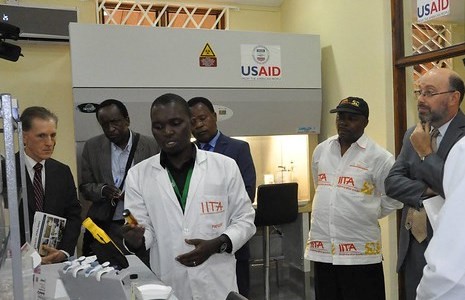Speeches Shim

Flood Response Update - USAID's Office of Foreign Disaster Assistance (OFDA) has released an additional $550,000 (MK 400 million) to support ongoing flood relief efforts in some of the most heavily impacted districts in the south. USAID implementing partners CARE and CRS will use these funds to support farmers who lost crops during the floods by procuring maize seeds and sweet potato vines, which will then be distributed at seed fairs. During these seed fairs, farmers can share information with one another and also pursue basic agricultural technical assistance. This additional support follows earlier announced $4.3 million in flood relief, bringing total U.S Government support to $4.850 million to date. USAID remains deeply engaged in supporting Malawi's flood response efforts.
Aflatoxin Lab/Aflasafe Launch - Aflatoxins are a poisonous substance produced by a naturally-occurring soil-borne fungus. When consumed in large quantities, aflatoxins can have a spectrum of negative health effects, such as immune system suppression, liver damage, and even liver cancer. In children, aflatoxins can also stunt growth and delay development. Their presence in locally produced maize and groundnuts puts Malawians’ health at risk and also means that Malawi is shut out of potentially lucrative international markets that do not accept crops with a significant likelihood of aflatoxin contamination.
To combat this, USAID’s Feed the Future Malawi Improved Seed Systems and Technologies (MISST) Project invested over $2 million to reduce aflatoxin contamination in food. With this investment, MISST helped establish the Aflatoxin Testing Laboratory at the Chitedze Research Station and funded research by the International Institute of Tropical Agriculture (IITA) and Malawi’s Department of Agriculture Research Services (DARS) to develop Malawi-specific and biologically safe aflatoxin control products.
Based on these investments and efforts, two Malawi-specific versions of a highly effective biocontrol product - Aflasafe - have been successfully developed and tested with Malawian farmers. Field trials over the past three years have demonstrated that the Malawi-specific versions of Aflasafe have successfully and safely reduced aflatoxin levels in maize and groundnuts by more than 90 percent. Based on these results, in December of 2018 the Malawi Agricultural Technical Clearing Committee (ATCC) cleared the product for release and use by farmers.
The Aflatoxin Laboratory was transferred to the Government of Malawi on April 10, 2019, and the next step is to develop a commercialization strategy and involve the private sector in the production and distribution of the products.
Prefabricated HIV Clinics Dedicated - On April 8, 2019, Mission Director Lit Tazewell joined Ministry of Health officials to celebrate the handover of 15 “pre-fab” clinics in Zomba District. USAID invested $1.3 million in the 15 prefab clinics for Zomba district through the flagship HIV service delivery mechanism, EQUIP, which has supported the Ministry of Health (MOH) to deliver HIV services at 257 health facilities in fifteen districts since 2016. Right To Care implemented the EQUIP activity in partnership with three sub-partners: Baylor College of Medicine, Partners in Hope, and Dignitas International.
In 2016, PEPFAR conducted an assessment in three high-HIV-burden districts to quantify the human resource and space needs required to rapidly accelerate HIV treatment coverage toward the 90-90-90 goals articulated in Malawi’s National Strategic Plan for HIV/AIDS. In the 2016 Country Operational Plan, PEPFAR received supplemental funding to install pre-fabricated clinical units to create additional space to expand and improve the quality of HIV testing services (HTS) and antiretroviral therapy (ART). Through this investment, PEPFAR installed a total of 79 clinic units in 55 sites and an additional 15 pre-fab pharmacy units in 15 sites (building on the COP 14 investment of 32 pre-fab pharmacies).
The Zomba prefab units will serve the growing patient volumes at facilities as a result of the national HTS and ART scale up. Each clinic has between six and eight rooms and is fully furnished. Units installed at facilities not connected to the national energy grid are fitted with solar power units. Each unit has dedicated rooms for HIV testing services, consultation rooms for nurses and clinicians, dispensing rooms, a data room, and two outdoor waiting areas on opposite ends.
Medical Equipment Handover - On April 3, 2019, Ambassador Virginia Palmer transferred essential medical equipment and supplies to Malawi’s Ministry of Health for use in health facilities throughout the country. USAID’s flagship maternal and child health project - Organized Network of Services for Everyone (ONSE) - worked with Ministry of Health staff to identity key equipment needs. The goods, valued at $1.8 million (MWK 1.3 billion), include essential equipment and supplies for maternal and neonatal care, child health, family planning, and malaria - such as oxygen concentrators, vacuum extractors, and infant resuscitation kits. Some of the resources were devoted to helping the Kamuzu Central Hospital restore and maintain its lift system, a critical feature of the hospital’s patient care system. In addition to the medical equipment and supplies, Ambassador Palmer turned over textbooks for the Kamuzu College of Nursing (KCN). The textbooks will support the KCN Library and the new Nursing and Midwifery PhD programs. The books cover a wide range of subjects and will help KCN meet the National Council for Higher Education standards for PhD programs.

Comment
Make a general inquiry or suggest an improvement.